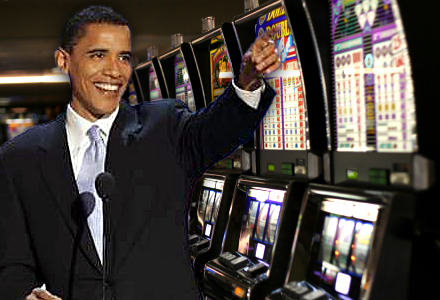 On Tuesday, the Obama administration rescinded a US federal regulation that prohibited Indian tribal casinos from being located too far off-reservation. That regulation, dubbed the ‘commutability rule,’ was enacted in 2008 by the Bush administration with the idea of preventing mass migration of natives off reservation to attain jobs in the distant casinos. Larry Echo Hawk, Asst. Secretary for Indian Affairs, told the National Congress of American Indians that the regulation was “unnecessary and was issued without the benefit of tribal consultation. We will proceed to process off-reservation gaming applications in a transparent manner, consistent with existing law.”
On Tuesday, the Obama administration rescinded a US federal regulation that prohibited Indian tribal casinos from being located too far off-reservation. That regulation, dubbed the ‘commutability rule,’ was enacted in 2008 by the Bush administration with the idea of preventing mass migration of natives off reservation to attain jobs in the distant casinos. Larry Echo Hawk, Asst. Secretary for Indian Affairs, told the National Congress of American Indians that the regulation was “unnecessary and was issued without the benefit of tribal consultation. We will proceed to process off-reservation gaming applications in a transparent manner, consistent with existing law.”
While only five off-reservation casinos have been approved in the past 23 years, there are 10 such applications currently under review by the Interior Department. Tribes will still need to meet several criteria for opening new casinos, including entering into a tribal-state compact and getting approval from local residents and the state’s governor, but tribes such as New York’s St. Regis Mohawks are celebrating the administration’s decision. The St. Regis crew’s plan to build a casino in the Catskills was denied in 2008 under the commutability rule, despite the tribe’s argument that generations of Mohawk ironworkers had regularly commuted to New York City to build skyscrapers without much damage to tribal cohesion.
This isn’t the only favorable decision the Obama administration has handed Indian tribes. Earlier this month, Obama’s solicitor general submitted a brief urging the US Supreme Court not to review a lower court decision that favored the Rincon Band of Luiseño Indians. That case pitted the San Diego-area tribe against the state of California in a dispute over the number of slot machines the tribe was permitted to operate at their Harrah’s brand casino.
The dispute began in 2004 when the tribe was negotiating a new gambling deal with the state. California said it would allow the tribe to install more slot machines on the condition that the tribe paid a levy into the state’s general fund. Several tribes, including the Pechanga, Pala and Pauma, had agreed to similar terms, but the Rincon Band argued that the federal Indian Gaming Regulatory Act prohibited the state from using such negotiations to impose extra fees or taxes. The Rincons prevailed in court, and the 9th US District Court of Appeals upheld the decision last year by a 2-1 ruling.
The Rincon decision may have much wider impact than initially imagined. California tribes currently hold a state monopoly on casino gambling, for which they kick back about $300m annually into state coffers. But as other tribes openly muse about following the Rincon’s lead, the already cash-strapped state may consider rescinding that monopoly status, striking deals with commercial casino interests who are willing to pay what California asks.
Precisely what such an anarchic scenario would mean for the intrastate online poker bills California is considering – and from which tribes hope to directly benefit – is an unknown quantity. California’s Senate Governmental Organization Committee will reportedly hold an informational hearing on the two proposed poker bills sometime “in the next 2-3 weeks,” according to Chris Krafcik (@CKrafcik).






